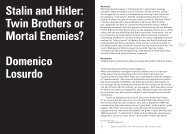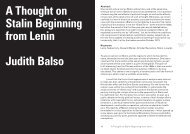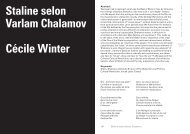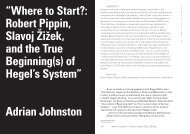Reflections on the Meaning of Stalinism Paul Le Blanc
blanc
blanc
Create successful ePaper yourself
Turn your PDF publications into a flip-book with our unique Google optimized e-Paper software.
our most terrible argument ever, as he angrily rejected and returned <strong>the</strong><br />
gift.<br />
I was stunned that George saw this massively-documented critique<br />
<strong>of</strong> <strong>Stalinism</strong> as an assault <strong>on</strong> all that he was. I insisted this was not true,<br />
but in <strong>the</strong> crescendo <strong>of</strong> argument I asked: “If we were in <strong>the</strong> Soviet Uni<strong>on</strong><br />
during Stalin’s time, and I was making <strong>the</strong>se criticisms <strong>of</strong> him, would you<br />
turn me in?” With fury he asked: “What do you expect me to say to that?”<br />
I h<strong>on</strong>estly resp<strong>on</strong>ded: “I expected you to say no.” He just looked at me,<br />
and I realized that for him to say such a thing might have been a lie. This<br />
flowed from a political culture that he had embraced and that had shaped<br />
him as a political pers<strong>on</strong>.<br />
The ir<strong>on</strong>y is that George himself, had he for some reas<strong>on</strong> sought<br />
refuge in <strong>the</strong> Soviet Uni<strong>on</strong> up<strong>on</strong> leaving Spain in 1937, would most likely<br />
have perished. In <strong>the</strong> book American Commissar, a veteran <strong>of</strong> <strong>the</strong> Lincoln<br />
Battali<strong>on</strong>, ex-Communist Sandor Voros (at <strong>the</strong> time <strong>of</strong>ficial historian <strong>of</strong><br />
<strong>the</strong> Fifteenth Brigade), had written this descripti<strong>on</strong>:<br />
. . . Luck finally led me to George Brodsky who had been denounced<br />
to me by most <strong>of</strong> those early arrivals as <strong>the</strong> worst example <strong>of</strong> <strong>the</strong> behavior<br />
<strong>of</strong> Party leaders and commissars in Spain.<br />
When I located him, George Brodsky was being kept in seclusi<strong>on</strong><br />
awaiting repatriati<strong>on</strong>. I found him a broken old man although barely in his<br />
thirties. He wouldn’t talk to me at first, he had been pledged to secrecy.<br />
When I finally induced him to c<strong>on</strong>fide in me, he not <strong>on</strong>ly talked, he spilled<br />
over.<br />
His account was not quite coherent – he was still unnerved by<br />
his experiences, his eyes would dissolve in tears from time to time as he<br />
pleaded for my understanding. . . .<br />
There follows an account <strong>of</strong> <strong>the</strong> initial group <strong>of</strong> U.S. volunteers – illtrained,<br />
ill-prepared, with no experienced leadership – arriving in Spain<br />
at <strong>the</strong> start <strong>of</strong> 1937. “Officially, Brodsky had been placed in charge <strong>of</strong> <strong>the</strong><br />
group in New York but he lacked <strong>the</strong> necessary qualities <strong>of</strong> leadership<br />
and experience to enforce his authority.” Once in Spain, he was given<br />
resp<strong>on</strong>sibility for <strong>the</strong> increasing numbers <strong>of</strong> U.S. volunteers arriving<br />
daily – but with no power, no authority, and little experience, it was<br />
impossible for him to find his way amid <strong>the</strong> complexities <strong>of</strong> <strong>the</strong> situati<strong>on</strong>.<br />
Rebelliousness am<strong>on</strong>g U.S. volunteers, anti-American c<strong>on</strong>tempt from <strong>the</strong><br />
French volunteers under André Marty, impatience from <strong>the</strong> high command<br />
<strong>of</strong> Internati<strong>on</strong>al Brigades “culminated in <strong>the</strong> Americans being sent to<br />
<strong>the</strong> Jarama fr<strong>on</strong>t without training, under a makeshift and inexperienced<br />
command, which resulted in <strong>the</strong> death <strong>of</strong> a disproporti<strong>on</strong>ately high<br />
number <strong>of</strong> <strong>the</strong>m right at <strong>the</strong> outset <strong>of</strong> <strong>the</strong> battle.” Voros c<strong>on</strong>cludes:<br />
Brodsky was eventually removed and a few days after our talk<br />
whisked back by <strong>the</strong> party to <strong>the</strong> United States in ignominious secrecy.<br />
He was still absolutely loyal to <strong>the</strong> party when we had our talk – he was<br />
C<br />
R<br />
I<br />
S<br />
I<br />
S<br />
&<br />
C<br />
R<br />
I<br />
T<br />
I<br />
Q<br />
U<br />
E<br />
/<br />
Volume 3 /<br />
Issue 1<br />
not sufficiently astute politically to comprehend that <strong>the</strong> enormous weight<br />
<strong>of</strong> guilt for <strong>the</strong> needless deaths <strong>of</strong> those comrades which had brought<br />
about his breakdown was not his but rested up<strong>on</strong> <strong>the</strong> Central Committee<br />
<strong>of</strong> <strong>the</strong> American party for entrusting <strong>the</strong> fate <strong>of</strong> hundreds into such<br />
inexperienced hands. 4<br />
The authoritarian ethos that had triumphed within U.S. Communism<br />
was at <strong>the</strong> heart <strong>of</strong> <strong>the</strong> problem. The word came down from <strong>the</strong> Stalin-led<br />
Communist Internati<strong>on</strong>al to Earl Browder and o<strong>the</strong>r leaders <strong>of</strong> <strong>the</strong> U.S.<br />
Party that American volunteers should be recruited and sent to Spain to<br />
be part <strong>of</strong> <strong>the</strong> Internati<strong>on</strong>al Brigades. Ready or not, it was d<strong>on</strong>e, with a<br />
“leader” who was absolutely loyal, not <strong>on</strong>e whose leadership had been<br />
proved in struggle. The tendency toward bureaucratic irresp<strong>on</strong>sibility<br />
c<strong>on</strong>tinued to play itself out <strong>on</strong>ce <strong>the</strong> volunteers reached Spain. George<br />
Brodsky was almost as much a victim as those who fell at Jarama.<br />
In my “new left” phase, when I showed him <strong>the</strong> Voros book, George<br />
had c<strong>on</strong>firmed <strong>the</strong> basic truth <strong>of</strong> this account, adding that intensive<br />
psycho<strong>the</strong>rapy enabled him to put his life back toge<strong>the</strong>r. Ano<strong>the</strong>r blow,<br />
however, was that his name was placed briefly <strong>on</strong> a list <strong>of</strong> politically<br />
unreliable comrades circulated by <strong>the</strong> U.S. Communist leadership. Yet it<br />
was in this period that a high percentage <strong>of</strong> Spanish Civil War veterans<br />
in <strong>the</strong> USSR – with war records much better than George’s – were victims<br />
<strong>of</strong> <strong>the</strong> late 1930s purges. “In all probability,” comments Roy Medvedev,<br />
“Stalin shot many more Soviet participants in <strong>the</strong> Spanish Civil War than<br />
<strong>the</strong> number killed by fascist bullets in Spain.” 5<br />
What motivated my parents and my uncle and so many o<strong>the</strong>rs<br />
to join a global Communist movement headed by Joseph Stalin was<br />
not a hunger for tyranny, bureaucratic irresp<strong>on</strong>sibility, authoritarian<br />
mismanagement, or murderous purges. They joined what <strong>the</strong>y believed to<br />
be <strong>the</strong> most hopeful struggle in human history to create a world without<br />
exploitati<strong>on</strong> or oppressi<strong>on</strong>, with rule by <strong>the</strong> people over <strong>the</strong> ec<strong>on</strong>omic<br />
structures and resources <strong>on</strong> which all depended, a society <strong>of</strong> <strong>the</strong> free and<br />
<strong>the</strong> equal. Despite all <strong>the</strong> problems that cropped up in that movement,<br />
<strong>the</strong>y did make significant c<strong>on</strong>tributi<strong>on</strong>s to <strong>the</strong> struggle for human rights<br />
and human liberati<strong>on</strong>. For most <strong>the</strong>re is now little c<strong>on</strong>troversy that <strong>the</strong><br />
c<strong>on</strong>tributi<strong>on</strong>s <strong>of</strong> <strong>the</strong> Communist Party were entangled with <strong>the</strong> terrible<br />
destructiveness <strong>of</strong> <strong>Stalinism</strong>. Yet Jack O’Dell, a l<strong>on</strong>g-time trade uni<strong>on</strong><br />
activist and later as an aide to Martin Lu<strong>the</strong>r King, Jr. in <strong>the</strong> civil rights<br />
movement, <strong>on</strong>ce made a key point. Am<strong>on</strong>g black comrades, “I never<br />
met any<strong>on</strong>e who joined <strong>the</strong> Communist Party because <strong>of</strong> Stalin or even<br />
because <strong>of</strong> <strong>the</strong> Soviet Uni<strong>on</strong>,” he emphasized. “They joined because<br />
4 Voros 1961, pp. 332-334.<br />
5 Medvedev 1989, pp. 472-473.<br />
C<br />
R<br />
I<br />
S<br />
I<br />
S<br />
&<br />
C<br />
R<br />
I<br />
T<br />
I<br />
Q<br />
U<br />
E<br />
/<br />
Volume 3 /<br />
Issue 1<br />
84 <str<strong>on</strong>g>Reflecti<strong>on</strong>s</str<strong>on</strong>g> <strong>on</strong> <strong>the</strong> <strong>Meaning</strong> <strong>of</strong> <strong>Stalinism</strong><br />
85<br />
<str<strong>on</strong>g>Reflecti<strong>on</strong>s</str<strong>on</strong>g> <strong>on</strong> <strong>the</strong> <strong>Meaning</strong> <strong>of</strong> <strong>Stalinism</strong>






